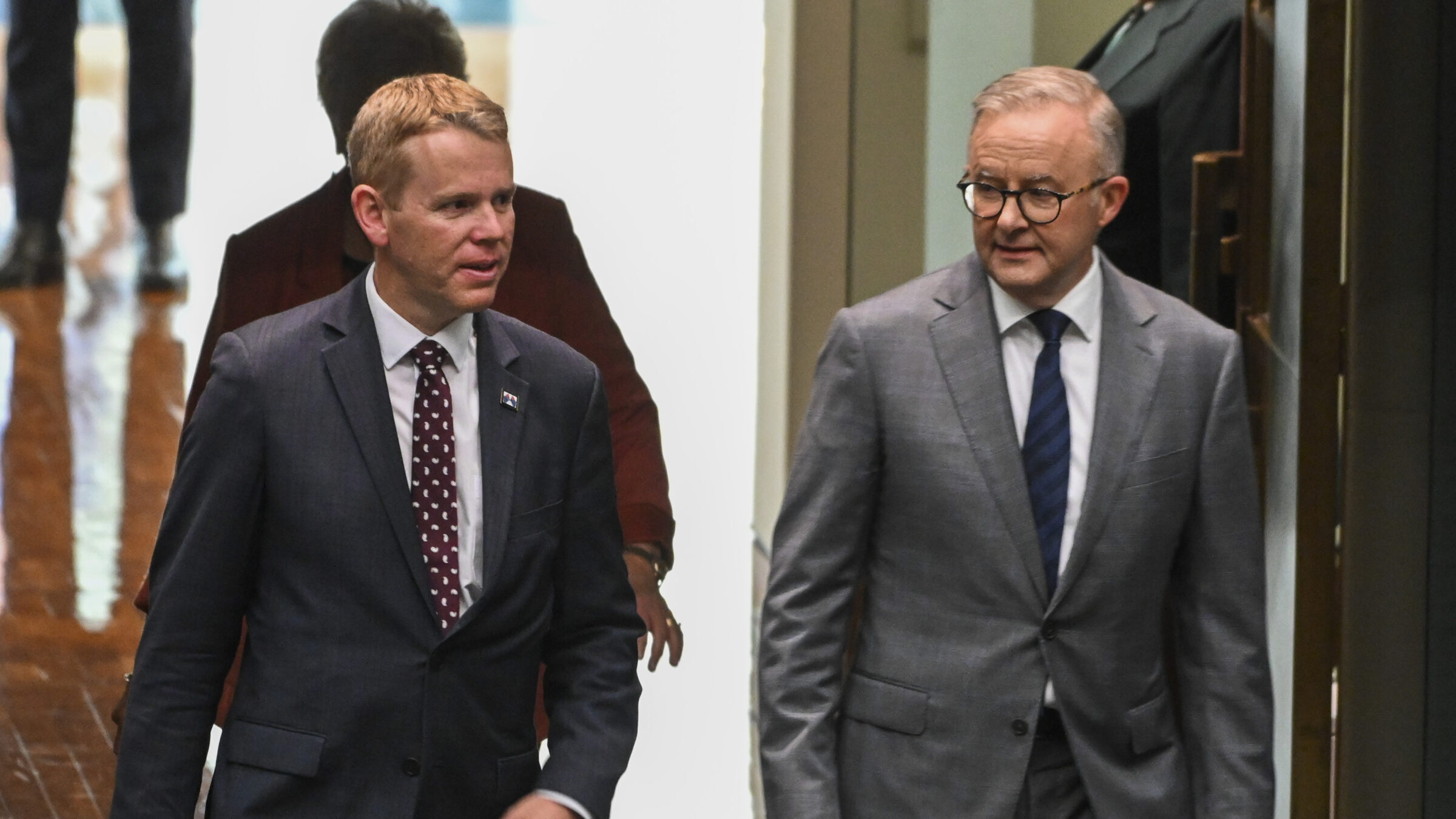Global, Naval Warfare
By
Tim Fish

Australian Prime Minister Anthony Albanese (R) and New Zealand Prime Minister Chris Hipkins arrive for Question time at Parliament House on February 07, 2023 in Canberra, Australia. (Photo by Martin Ollman/Getty Images)
WELLINGTON — When Kurt Campbell, the Biden administration’s Indo-Pacific “Czar” visited the Kiwi capital in March, one of his main missions was to feel out New Zealand’s leadership on the idea of their participation in Pillar 2 of the AUKUS military technology agreement.
At the time, New Zealand Minister of Defence Andrew Little stated that the government is “willing to explore” joining the agreement, currently based around Australia, the UK and US — sending eyebrows up in those capitals. Those eyebrows went up further when New Zealand Prime Minister Chris Hipkins followed a mid-April meeting with Australian Prime Minister Anthony Albanese by saying, “New Zealand agrees with the AUKUS partners that the collective objective needs to be the delivery of peace and stability and preservation of an international rules-based system in our region.”
Those two comments, while fairly benign, were enough to raise cheers from those who advocate for strengthened Western ties in the region as a counter to China. But among the political elite in Wellington, there is disagreement about the value of New Zealand joining this element of the AUKUS partnership — disagreements that could end any realistic chances of New Zealand becoming the fourth member of the agreement.
Kiwi supporters point out the security and economic benefits of developing future military technology as part of Pillar 2. Opponents worry about the negative political impact with New Zealand’s Pacific Island and Southeast Asian neighbors — or raise concerns that joining AUKUS could end Wellington’s commitment to an independent foreign policy and nuclear-free South Pacific region.
RELATED: Despite AUKUS pledges, Aussie defense spending drops $15.B, report says
While AUKUS has been billed as a nuclear-submarine sharing agreement, that only reflects part of the agreement — albeit a major one for Australia. What New Zealand is looking at is the package known as AUKUS Pillar 2, which involves the sharing of advanced technologies, including artificial intelligence (AI), quantum computing, cyber, undersea capabilities, hypersonic weapons, information-sharing and electronic warfare.
Anna Powles, a senior lecturer at the Centre for Defence and Security Studies at Massey University, told Breaking Defense that so far Pillar 2 is “scant on details” and until there is more information about what is included in this part of AUKUS it is difficult to know if it makes sense for New Zealand to join.
While there is “strong agreement on the security challenges in the region” between New Zealand, Australia and the US and there are “obvious benefits” for New Zealand to join Pillar 2, Powles said, “it could be seen as jarring and contradictory to New Zealand’s anchoring of its national identity in the Pacific.”
Military relations between the AUKUS nations and New Zealand have always been a series of contradictions. On the one hand, New Zealand and Canada join the three AUKUS nations in the “Five Eyes” pact, sharing in the most sensitive of security intel. On the other hand, in 1987 New Zealand was thrown out of the Australia-New Zealand-US (ANZUS) Alliance after Wellington banned nuclear weapons and nuclear propulsion from its territory.
RELATED: The AI side of AUKUS: UK reveals ground-breaking, allied tech demo
Still, recent years have seen all sides in agreement about the growing threat from Chinese military capabilities — the threat that AUKUS is aimed squarely at combating. In this sense New Zealand is in lockstep with Australia, the UK and the US.
However, Powles said this has created an “uncomfortable contradiction” for New Zealand because it has also “fought very strongly in recent years to be seen as very much as part of the Asia-Pacific, not as an Anglo-antipodean outpost.”
Powles explained that so far New Zealand has been “very good at managing a policy of strategic ambiguity to a degree in the way that it has hedged and balanced its relationships between China and the US” but joining AUKUS would be picking a side. As she put it, “you can’t have one foot in and one foot out.”
Uncertainty Ahead Of Elections
Politics, both internal and external, will ultimately decide the fate of New Zealand and AUKUS. Notably, when asked for follow up comment, Little told Breaking Defense in a May 31 statement that “No formal approach has been made to us by any AUKUS partner and we wouldn’t expect anything before the election.”
New Zealand’s next general election is expected on Oct. 14, but its proportional electoral system means that governments are usually formed through a coalition of major and minor parties. Neither the governing Labour Party nor the main opposition National Party have indicated what their position would be on Pillar 2 membership — but each are likely to have to rely secondary parties to help secure any majority.
It is likely the Green Party will be skeptical about the benefits of Pillar 2 and this influence could shape any continuing Labour-led administration’s view of AUKUS. (Repeated requests for comment from the Green Party on this topic were not returned.) The ACT Party, which likely would form a coalition with National, has been more supportive of the idea.
ACT defense spokesperson James McDowall told Breaking Defense that it was important New Zealand and its allies have a “united front on defense and international security issues and support values of freedom and democracy.”
He added that it is “unclear” what the current government intends to do, and although the National Party have not expressed any opposition to Pillar 2 membership, it “would come down to coalition negotiations on the day.”
RELATED: Mateship’s not enough: ASPI urges better US understanding of Aussie forces
ACT want to increase in defense spending to 2% of GDP and contribute more to international security. McDowall said that under its plans Pillar 2 membership would be “part of the wider expansion of defense capability” and that “it would be a great shame if New Zealand didn’t benefit from the technologies that Pillar 2 could bring about in cyber security, AI or quantum computing.” He added that Pillar 2 would allow New Zealand to “at least keep pace with our closest neighbors” and “wouldn’t make sense if New Zealand was left out of it.”
Complicating things even further is the specter of a split parliament where Te Pāti Māori — the Maori Party — could be the swing vote of who gets the majority. A poll released May 30 found an effective dead heat between the two parties, with the Maori Party holding just enough votes to make the deciding call. In a recent interview, John Tamihere, the president of Te Pāti Māori, said his party would be “totally opposed” to joining AUKUS. (National leader Chris Luxom on May 10 ruled out a coalition with the Maori Party, although situations can change as elections get closer.)
Geopolitics In Focus
New Zealand has supported the Treaty of Rarotonga signed by the Pacific Island states in 1986 that formalizes a nuclear-weapon-free zone in the South Pacific. But even if New Zealand makes it clear to its partners in the region that its nuclear stance will not change, signing up to Pillar 2 will raise questions.
Reuben Steff, a Senior Lecturer at the University of Waikato, told Breaking Defense that Pillar 2 would have “diplomatic implications” with the Pacific Islands and their response is “of great concern” if New Zealand’s credibility could be damaged.
It is possible that joining AUKUS Pillar 2 is potentially “a step too far” he said given New Zealand’s strong support for nuclear non-proliferation and for a large number of the Kiwi public “the nation’s anti-nuclear credentials are viewed as part of their national identity.”
However, Steff believes that New Zealand has “more to gain than lose” being part of Pillar 2 because the technologies involved will be decisive factors in an emerging revolution in strategic affairs. “Ensuring New Zealand’s access is essential [and] it will ensure the New Zealand Defence Force remains interoperable with key military partners” he said.
“Without joining Pillar II, New Zealand’s broader strategic, security, and intelligence ties with the AUKUS nations could atrophy. Lacking interoperability with its peers means New Zealand military doctrine will fall out of step.”
Steff noted that information sharing protocols and communications channels with the AUKUS partners may be upgraded based on Pillar 2 technologies. Falling behind here could jeopardize the existing Five Eyes intelligence-sharing arrangement. Pillar 2 technologies also have broader significance as Steff believes they are set to become a key part of modern economies and industries and that joining a collaborative effort will “incubate innovation” and “help energize” New Zealand industry.
Already, some of the highest-tech New Zealand companies do work with the AUKUS nations on technology that lines up with Pillar 2. Rocket Lab, for instance, works with US Space Force, and Steff highlighted others such as Starboard that use AI to track illegal fishing vessels and X-craft that uses AI for navigation and object detection and response. New Zealand firms also have a host of expertise in rocketry, wireless power transmission, underwater sensors, hydrophones and data storage technologies.
Steff also anticipates an overhaul of the NZDF and expects an increase in defense spending in New Zealand’s upcoming defense review including the potential to re-establish an air-strike capability. “As such, the days of tailoring the NZDF for peacekeeping operations appear to be ending, a fact reinforced by NZ’s acquisition of four P-8 Poseidon” anti-submarine aircraft, he said, “This shift is one that complements ADF priorities but, for the NZDF to remain interoperable with the Australian military in the future, it needs to secure access to Pillar 2 technologies.”
Risks Vs Reward
However, Robert Patman, Professor of International Relations at Otago University told Breaking Defense that “the risk of joining outweighs the benefits” and that the evidence points to New Zealand’s interests and values being safeguarded “by a cautious approach to AUKUS.”
Patman said that that strategic assumptions behind AUKUS — that a new Cold War is emerging between the US and China — “are contestable to say the least,” because China’s rise to superpower status “has been based on the full participation in the global market economy with the tacit support of the Western world.”
He added: “China’s ambitions are real, but they should not be overhyped” because the level of economic interdependence between Beijing and the US, Japan and the EU means that any move on Taiwan would be “a political and economic disaster to China.”
For New Zealand, Patman said the danger is that “while the government claims any participation in AUKUS will not come at the expense of its non-nuclear policy, it can’t control the perceptions of others. New Zealand could be seen as effectively watering down its non-nuclear commitments and its vision in the eyes of ASEAN and South Pacific Island States.”
He added that joining AUKUS Pillar 2 could have “big implications” for New Zealand that could undermine the perception that New Zealand pursues an independent foreign policy, and instead is viewed as falling into lockstep with US, UK and Australia.
Malaysia, Indonesia and the Pacific Islands have been critical of AUKUS, which Patman blames on suspicions that AUKUS may contravene the Nuclear Proliferation Treaty with the transfer of nuclear technology from one of the five legal nuclear powers to a non-nuclear power.
“I don’t think New Zealand can have its cake and eat it on this one,” he said, “It might be a difficult message from New Zealand to say: ‘We are still championing nuclear disarmament and opposing proliferation, but we are participating as a so-called non-nuclear member of AUKUS’ – that’s a complex message.”
Patman also disagrees that New Zealand would lose access to the modern technologies developed under Pillar 2 if it did not participate in AUKUS. “That assumes that the US, UK and Australia has a monopoly on such technology, because they don’t, and it is not in their interest to deny it to New Zealand,” he argued. New Zealand is already a member of the Five Eyes, partner of NATO and has strong bilateral relations with both Australia and the US.
“There is an assumption that if you don’t want to join AUKUS you’re soft on China, I don’t think that’s true. I think many people in [New Zealand] are all for standing up to China. But don’t necessarily see AUKUS as the best vehicle for doing it,” Patman said.







.JPG)
